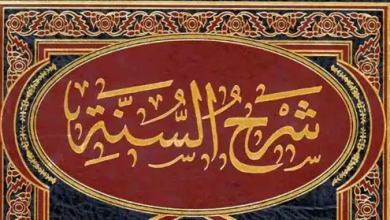A Call to Justice
A Call to Justice[1]
By Salāh Abū ‘l-Hājj[2]
Translated by Muntasir Zaman
All praise belongs to Allah. We praise Him, seek assistance from Him and ask of Him forgiveness and guidance. We send blessings on His chosen and noble Messenger, who was sent with the upright Sharī‘ah for the guidance of all the worlds; and [we send blessings] on his progeny and his brilliant and fortunate companions, those who were loyal to his commands and trod on his sublime path; and [we send blessings] on those who followed them in excellence from the practicing scholars, those who preserved His religion and way until the Day of Judgment.
To proceed:
It is amongst the greatest necessities of this time that various Islāmic notions concerning different aspects of life are corrected, as a result of the religious isolation in which we live due the subjugation of the disbelievers and the spread of the intellectual incursion that has engulfed our lives.
Amongst the most distinct of these notions to have encountered confusion and great error in terms of its understanding is Islāmic Jurisprudence (al-Fiqh al-Islāmī), which the Muslims have ruled in accordance with, and have approved of, for the duration of fifteen centuries, in all aspects of their life. Thus, it would keep pace with those situations that newly emerged, and presented to them legislative solutions for all their religious, collective and financial problems. [This was] because their attitude towards Fiqh was an attitude of submission, reverence, honor and estimation, due to their confidence in the knowledge and piety of its imams, and that they put themselves up for [the task of] pursuing Islāmic rulings from their detailed evidences with complete integrity and scrupulousness.
This attitude of the adherents of Islām towards their religion would enrage their enemies and hinder the infiltration of their ideologies and idiosyncrasies amongst the Muslims. This is why colonialism undertook to shake the confidence of the general masses in Fiqh and its imams, by casting doubts on its derivation from its proofs, until the situation was reached by them of regarding it as [merely] the opinions of men and different points of view, which we are not obliged to [abide by] nor enforce.
The reformation movement of al-Azhar has taken upon its shoulder to promote this ideology and call to it, as a consequence of which the faculties of Sharī‘ah in the Islāmic world were affected by it, because they were founded on a similar pattern to al-Azhar, and most of their teachers were graduates of al-Azhar.
Accordingly, the introductory books of Fiqh portray Fiqh in its contemporary understanding after the reformation movement, and do not give a true picture of the reality of Islāmic jurisprudence which the Muslims have known and recognized throughout their lengthy history. This is reckless injustice which people of fairness disapprove of, for, as is known, the betterment of the latter part of this Ummah can only take place by means of that from which its former part received betterment, and the betterment of its former part was via Fiqh in its form understood among them, of strict adherence to Fiqh, not in its modern representation.
Therefore, it is an obligation upon us to inform and caution against the divergence in methodology that has taken place, and make an effort to return matters to their original form, with [such] moderation that people of sound intellect and correct instinct will agree with, because it is unfair to discard the latter day prominent scholars of this Ummah from the last ten centuries during the era of Islāmic rule and power, [accusing them] of rigid dispositions and blind following, and consider our era as an era of intellectual and Fiqhi reawakening, while we are in a time where the Islāmic caliphate has disappeared, colonialism has taken over, its ideologies have become widespread and transgression and sin are committed openly .
It is unfair to accuse the Sahābah (may Allah be pleased with them), and at their forefront ‘Umar (ra), of changing the law of Allah according to their whims and fancies, and consider ourselves as custodians of Sharī‘ah in bringing it back to its reality.
It is unjust to attack the four imams of Islāmic jurisprudence by [accusing them of] leaving out evidences in some of their rulings, even though the Ummah have submitted to them and have received their Ijtihād with acceptance because their scholars knew that they were the most zealous of people in adhering to the Shar‘ī texts and in comprehending them as the successors before them and Saĥābah had comprehended them; and [it is unjust] to consider ourselves as adjudicators (Ĥukkāman) over their Fiqh by rejecting whatever we wish from it with the claim that it contradicts the Book and Sunnah, even though the one who observes these “adjudicators” over the imams notices that not one of them is able to reference a Hadīth to its sources. Due to this vilification [of the imams], the condition has become such that the vast majority of the Muslims rely in the rulings of their religion on books that were compiled in an unprecedented, unusual and strange, pattern: combining between schools of thought and selecting between them in accordance with the interest of the intellect that is bereft [of divine guidance], using exclamatory expressions in which there is belittling of the illustrious personalities of this Ummah and their Fiqh in relation to people known for their opposition, animosity and boldness towards the religion of Allah.
It is unjust to divide the jurists into two schools, the partisans of Hadīth [ahl al-Hadīth] and the partisans of reason [ahl al-Rāy], without any basis or proof, and consider the partisans of reason to be termed as such for the scarcity of Ahādīth in their possession. Does it make sense that we attack the religion of these eminent personalities, and [claim] that they are audacious in passing an opinion concerning the religion of Allah without any Shar‘ī texts, due to which we have the right to reject their Fiqh because it is mostly unsupported by Shar‘ī texts?
It is unjust that we take some of the innocent statements of the imams, such as their statement, “when a Hadīth is authentic, it is my opinion” and consider it a vilification of them, their Fiqh and those who follow them, because of which we reject many of their opinions, despite the fact that specific books were written to explain the correct meaning of it, and
[despite the fact] prominent jurists and scholars of Hadīth have recorded these statements without interpreting them as we have.
It is unjust that we look at Fiqh as if it were mere viewpoints and it is [thus] correct for us to take whatever we wish and leave whatever we wish without any basis, because this will open the doors of playing with, and a making a mockery of, the Sharī‘ah. Since when were the jurists legislators? It known that the only legislator is Allah, and “the jurists” is an expression about the expounders of the law of Allah and its correct intent, and nothing else. So each of them exercised ijtihād to the extent of his capacity to make this a reality. With regards to considering Fiqh as merely the opinions of men and regarding every ruling for which a verse or explicit Hadīth is not found as merely an opinion with no value, this is bizarre because most of the juristic rulings are deduced from the generalities of the Qur’ān, Sunnah and narrations of the Sahābah (may Allah be pleased with them). It is not necessary that an explicit text is found for each of them. If there was a text for every ruling, we would not be in need of Fiqh, but would suffice on Ahādīth alone. No intelligent person would say this, because the Ahādīth are very limited, whereas juristic rulings are endless.
The abovementioned oppression and injustice that has taken place of our scholars, imams and jurists is only the tip of the iceberg. I have drawn attention to much of it in this book [Al-Madkhal ilā ‘l-Fiqh al-Islāmī]. My only purpose of this research is to address intelligent minds and living hearts in assenting to the truth and placing Fiqh and its people in their lofty positions.
The respected reader will find [in this book] that which will quench [his thirst] in understanding the historical evolution of Fiqh as the predecessors and successors from its scholars have understood it. He will understand the gradual phases that Fiqh has passed through until it developed into the magnificent palace we boast about to the world; thus, we find lawmakers in international conferences confessing its status, and acknowledging that it is one of the sources from which they derived the laws of their countries. In addition, the reader will discover the causes that led the Ummah to follow only the four schools of thought, and that this was one of the ways Allah preserved His religion from interpolation and distortion as many learned personalities have clearly mentioned. The reader will realize, with dazzling proofs and evidences, the importance of this following [Taqlīd]…
[1] This is a translation of the preface Shaykh Salāh Abū ‘l-Hājj has written to his book, Al-Madkhal ilā ‘l-Fiqh al-Islāmī. The title of this article has been given by the translator.
[2] Shaykh Salāh Abu ‘l-Hājj is a Jordanian scholar born in the year 1974. He received his PhD in Islamic sciences from the University of Baghdad and is an assistant professor of Fiqh at Al- Balqa’ Applied University (BAU). He has published and edited over 100 books, treatises and articles on various topics of Sharī‘ah. One can appreciate the value of the words of Shaykh Salāh Abu ‘l-Hājj as he is a graduate and beneficiary of the educational system, which he critiques. Therefore, we can have confidence in his assessment of the shortcomings of such institutions in relation to the teaching of Fiqh.






